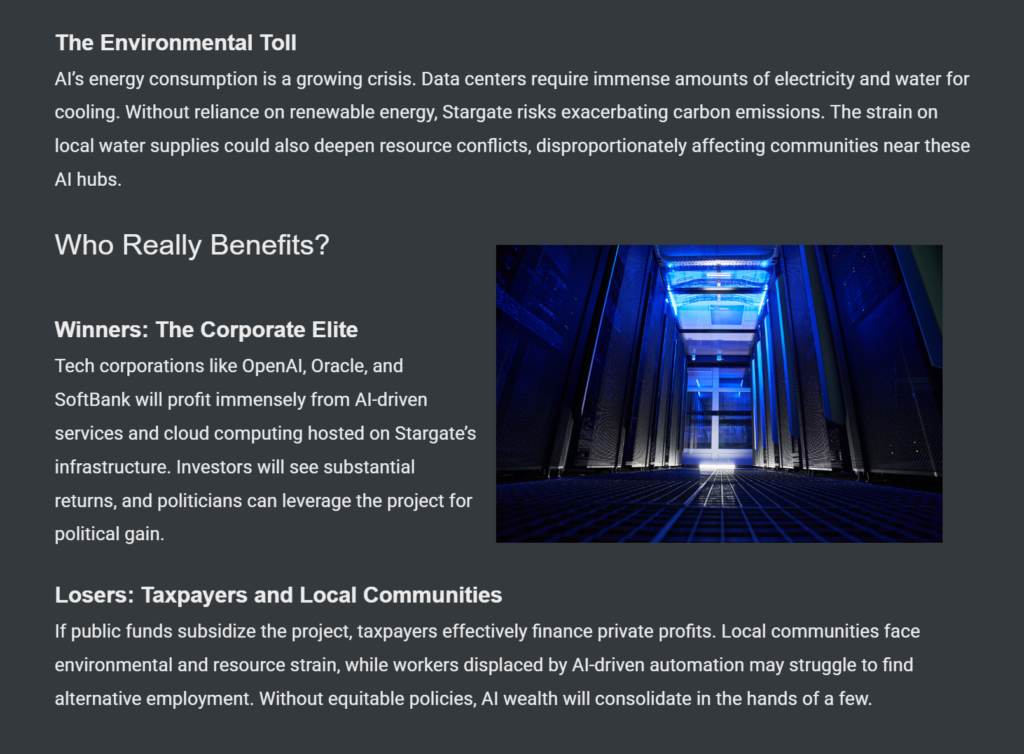The Grand Expansion
The Stargate Project, a $500 billion AI infrastructure initiative backed by OpenAI, SoftBank, Oracle, and other major players, aims to position the U.S. as the global leader in artificial intelligence. President Trump held a White House news conference leading with the ambitious project, promising it would lead to 100,000 jobs and revolutionary advancements. It presents itself as a game-changing investment. However, beneath the tech enthusiasm, questions arise: Who truly benefits? Who bears the costs?
The Reality Behind the Promises
What’s Driving This Initiative?
Stargate is fundamentally about building the computational backbone required for AI’s rapid advancement. With large-scale AI applications outpacing existing infrastructure, the project seeks to construct cutting-edge data centers. The geopolitical stakes are equally significant. AI is increasingly viewed as a national security asset, and the U.S. aims to outpace China in the AI arms race. Beyond technical necessity, investors and politicians frame Stargate as an economic revitalization effort, but the extent of its benefits remains uncertain.
The Job Creation Myth
While the President claimed it will create 100,000 jobs during the conference, many will admittedly be temporary construction positions that vanish once facilities are operational. Permanent roles will likely be highly specialized, leaving little opportunity for average workers. Worse, AI’s expansion could automate existing jobs, negating any short-term gains. Instead of broad employment benefits, job displacement could be the more lasting effect.
Healthcare & AI: Progress for Whom?
AI promises breakthroughs in drug discovery, personalized medicine, and diagnostics, potentially expediting vaccine development and disease prevention. However, these innovations risk being monopolized by corporations, limiting access to those who can afford them. AI-driven healthcare solutions could reinforce economic disparities rather than democratizing medical advancements.
The Environmental Toll
AI’s energy consumption is a growing crisis. Data centers require immense amounts of electricity and water for cooling. Without reliance on renewable energy, Stargate risks exacerbating carbon emissions. The strain on local water supplies could also deepen resource conflicts, disproportionately affecting communities near these AI hubs.
Who Really Benefits?

Winners: The Corporate Elite
Tech corporations like OpenAI, Oracle, and SoftBank will profit immensely from AI-driven services and cloud computing hosted on Stargate’s infrastructure. Investors will see substantial returns, and politicians can leverage the project for political gain.
Losers: Taxpayers and Local Communities
If public funds subsidize the project, taxpayers effectively finance private profits. Local communities face environmental and resource strain, while workers displaced by AI-driven automation may struggle to find alternative employment. Without equitable policies, AI wealth will consolidate in the hands of a few.
AI’s Role in Military & Surveillance
The militarization of AI is a major concern. Autonomous weapons, predictive intelligence, and mass surveillance tools are evolving rapidly. Without transparency, Stargate could deepen government surveillance and expand AI’s role in warfare. Facial recognition, social monitoring, and cyberwarfare technologies risk eroding civil liberties.
Critical Questions That Need Answers
- Who controls the infrastructure? Will Stargate be a public asset or a corporate monopoly?
- How will it be powered? Will AI infrastructure be built sustainably, or will it deepen fossil fuel dependence?
- Will AI create more jobs than it destroys? Are workforce retraining programs in place, or will AI widen economic inequality?
- What protections exist for AI ethics? Who ensures AI remains unbiased, ethical, and transparent?
- What is the government’s role? Will Stargate primarily serve the private sector, or will it expand military and surveillance applications?
A Future Shaped by AI, But for Whom?
Stargate’s promises of innovation and prosperity mask a deeper reality: AI’s benefits will likely be concentrated among tech elites and investors, while the public bears its economic, environmental, and ethical costs. Without oversight, AI could reinforce inequalities and expand corporate control over critical infrastructure.
The AI revolution does not have to follow this trajectory. With transparent governance, ethical oversight, and fair distribution of resources, AI can be a force for collective progress rather than elite consolidation. The challenge is ensuring that AI serves humanity, not just those at the top.


